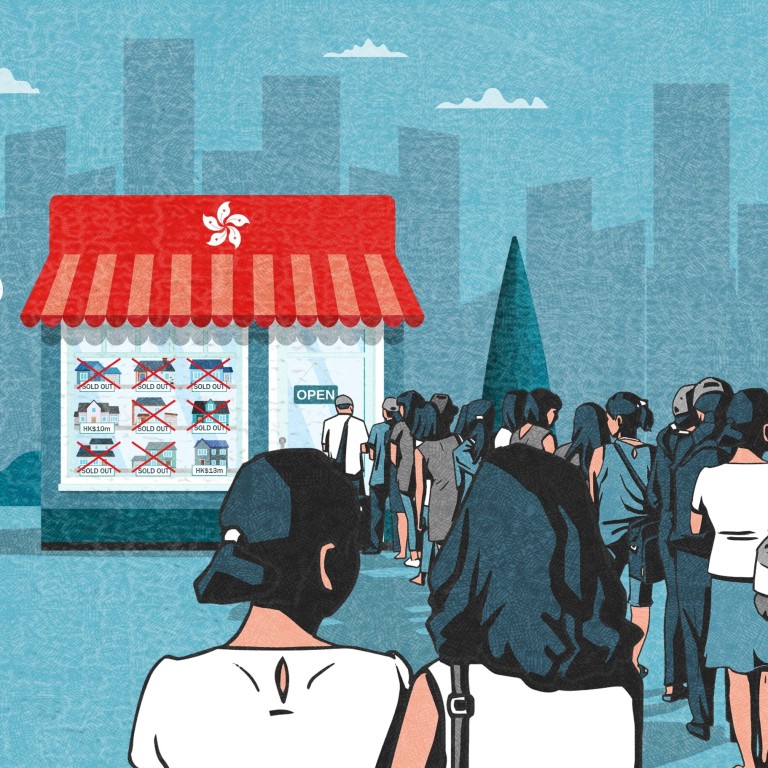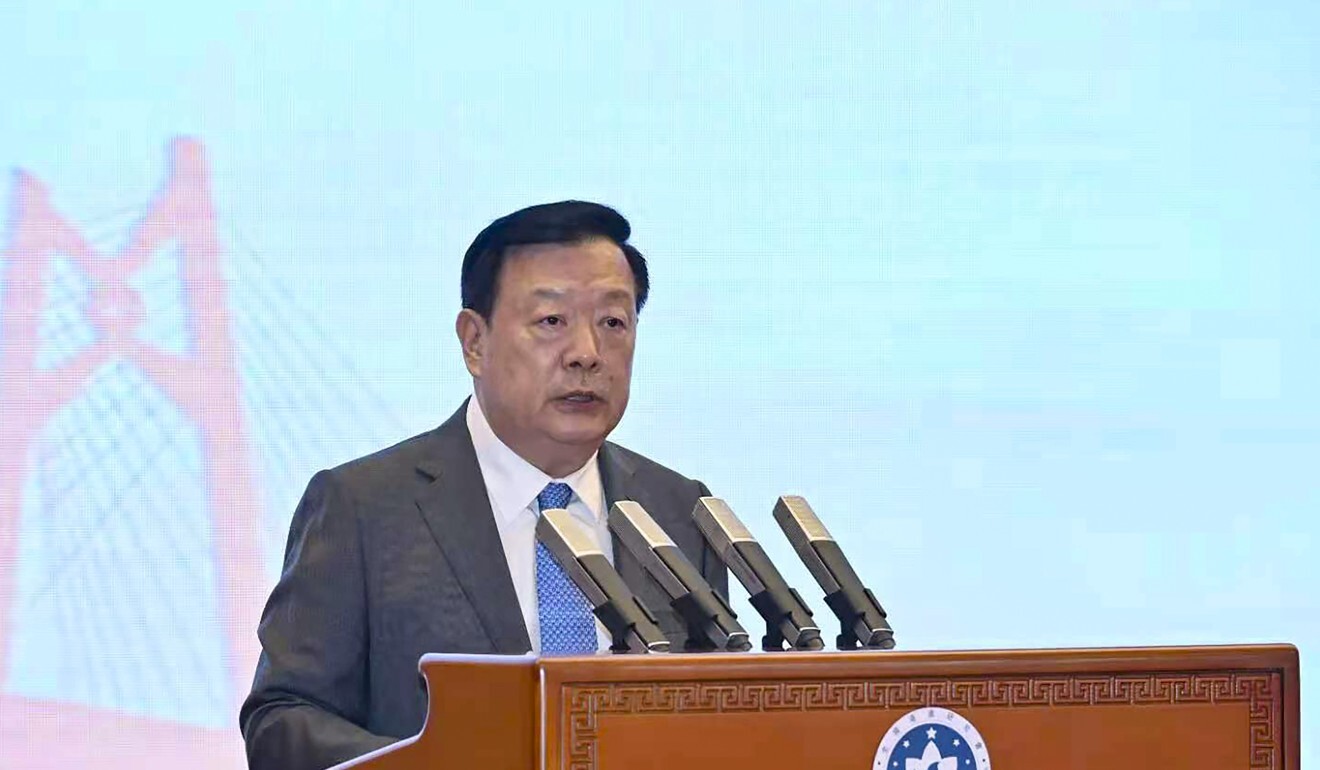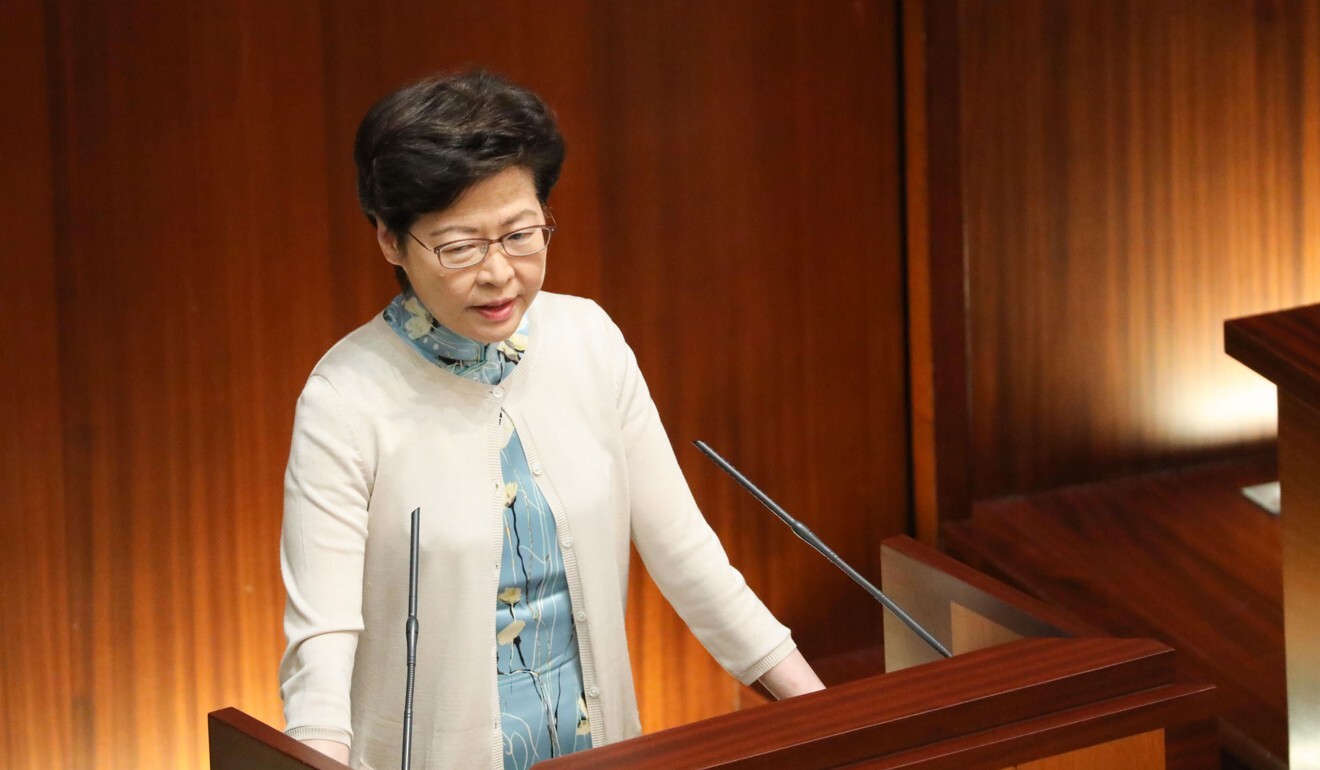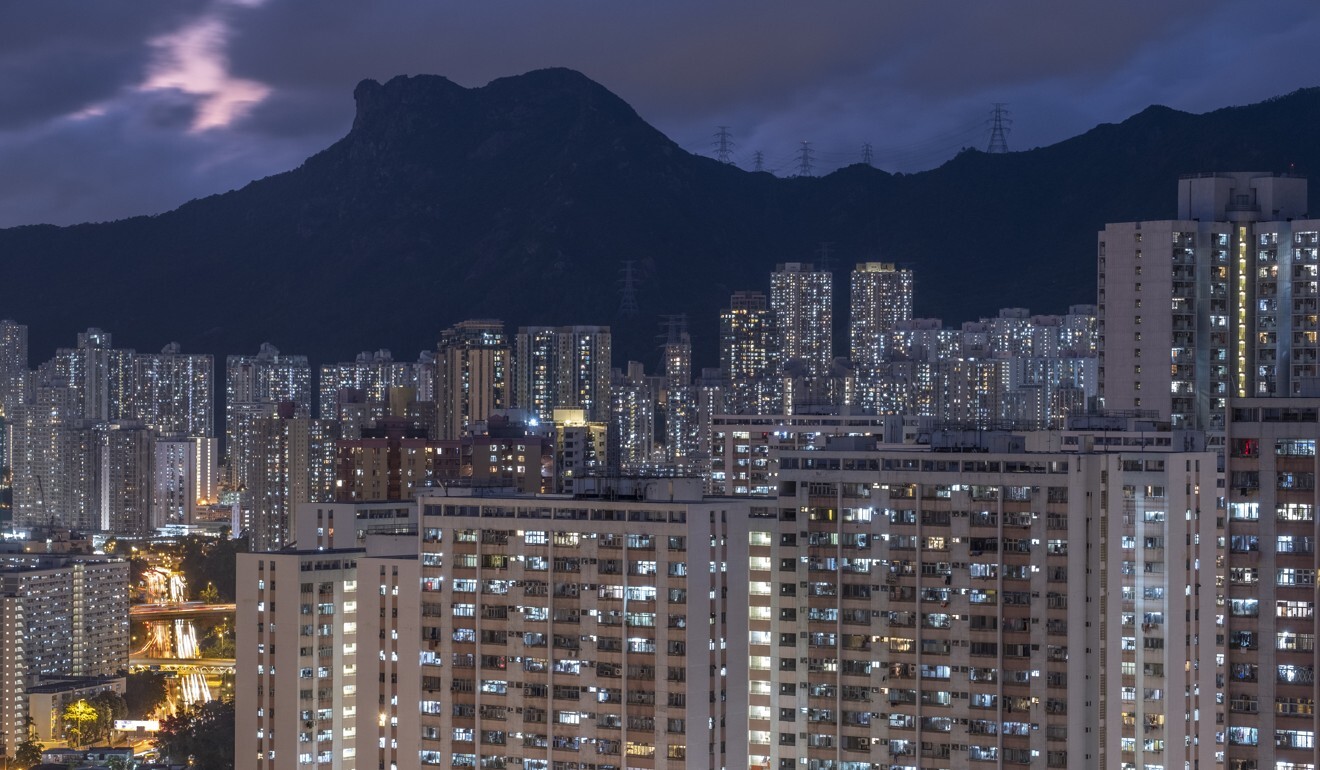
Hong Kong’s housing crisis: soaring prices put flats beyond reach, while queue to rent keeps growing longer
- Mainland Chinese migrants among poor families paying high rents for tiny spaces while awaiting rental flats
- Newlyweds who cannot afford to set up home save for years to buy ‘nano’ flats under 260 sq ft
In the first of a three-part series on Hong Kong’s housing crisis, the Post examines why demand outstrips supply, leaving Hongkongers unable to afford their own homes.
Airport worker Wong Ng is aware that Beijing wants Hong Kong to get rid of all tiny, substandard homes by 2049.
That ambitious goal is cold comfort for the permanent resident who has been waiting seven years to rent a public flat.
“Maybe it is possible, but many of us cannot wait until 2049. There’s still 28 years to go,” said Wong, 39.

Originally from China’s Jiangxi province, he first moved to Hong Kong in 1988. He later attended university in mainland China, got married and worked in advertising in Shenzhen before returning to Hong Kong seven years ago.
Home for his family of four is a 120 sq ft subdivided space in Tai Wo Hau.
There is a bunk bed for his wife, 34, son, 13, and three-year-old daughter. He sleeps on a single bed. They have their meals separately, as the dining table is too small. His son does his homework on his bed.

10:08
Hong Kong has until 2049 to fix its housing crisis, but is it possible?
“I came back to Hong Kong because the education system here is better for my children,” Wong said. “I didn’t expect to be staying in such a small flat, but this is the path we took.”
He pays HK$6,800 (US$874) a month in rent, plus about HK$700 for utilities.
Reduced shifts at work during the pandemic have shrunk his monthly pay to HK$9,000 recently, and if the situation drags on, the family may be forced to look for an even smaller living space.
“I just hope the government can think of ways to reduce the waiting time for public housing,” he said.

There were about 153,300 applicants such as Wong in the queue for public rental housing at the end of March, with an average waiting time of 5.8 years – the longest in 22 years and almost double the Housing Authority’s three-year service pledge.
In another queue, about 100,500 non-elderly singles are waiting too, and they have lower priority.
Until they get their flats, most pay thousands of dollars a month for Hong Kong’s smallest living spaces.
Private homes in short supply too
With demand outstripping supply, some say Beijing’s target will be hard, if not impossible, to achieve.
Subdivided homes, in which some of the city’s poorest residents live, are only part of the problem. Private housing is also in short supply, and priced so high, even the better-off cannot afford to buy.
Hong Kong to hit target of building 15,000 transitional homes by 2023: leader
In June, a 500 sq ft private flat sold for an average of HK$9.44 million on Hong Kong Island, HK$8.32 million in Kowloon, and HK$7 million in the New Territories, according to data from the city’s Rating and Valuation Department.
Such prices are beyond most people’s reach. A family would have to save for 20.7 years to afford a home, according to the annual Demographia International Housing Affordability Study in 2021, which ranked Hong Kong the world’s most expensive property market.
Astronomical property prices have driven most people to apply for public rental housing or try their luck in the subsidised home market if they qualify. But those who do not qualify, and those with nowhere to stay during their long wait for public housing, are forced to pay exorbitant rents for tiny living spaces.
Economics lecturer Vera Yuen Wai-han, of the University of Hong Kong’s business school, said the demand for housing was inelastic and mainly from people seeking homes for themselves.
While market-cooling measures – including various stamp duties introduced over the past decade – have worked to discourage speculators and foreign and corporate investors, new demand keeps piling pressure on supply.
She said new demand came from two groups – continuous arrivals from the mainland and couples getting married.

Mainland arrivals swell queue for homes
New immigrants from the mainland arriving on one-way permits to reunite with Hong Kong family members make up a significant chunk of applicants for public rental housing.
In a survey last year, the Housing Authority found that about a fifth of the family applicants surveyed were such people who arrived since 2017. At least half the household must have permanent residence before they are offered a flat.
Under the controversial one-way permit arrangement, a daily maximum of 150 mainlanders can come to Hong Kong to be reunited with family members.
Red tape trips up Hong Kong plan to use empty hotel rooms for temporary homes
More than 42,300 came in 2018, before the number fell to 39,060 in 2019 and 10,134 during the pandemic last year.
Chow Mei-chi, a social worker helping the Kwai Chung Subdivided Flats Residents Alliance, said the mainlanders who came were mostly the wives of Hong Kong men.
It usually takes six to seven years to obtain the one-way permit, and they are not allowed to work in Hong Kong while waiting. This means the women must rely on their husbands for economic support, and the men are often from the low-income group, doing manual labour jobs such as in construction.
“They will look for places where the rent is lower, so that’s why most of these families stay in subdivided units,” Chow said.
Hongkongers with children born in the city normally apply for public housing first, while their mainland spouses wait for the one-way permit.
It is estimated there are 110,000 subdivided units in rundown old buildings across the city. Landlords charge so much for these tiny spaces that many tenants pay per-square-foot rents higher than for a luxury flat.
Detractors of the one-way permit scheme have called for the daily quota to be reduced, citing growing stress on the city’s public resources, including housing.
But others have defended it, arguing that reuniting families is the right thing to do, and city officials point out that cross-border marriages have been rising, making up about a third of locally registered unions.
Dismissing the criticism that these mainlanders added to the housing burden, social worker Chow pointed out that mainlanders who obtained the permit were able to take on menial jobs like dish washing, which better-educated Hongkongers shunned.

Married with no home of their own
The government has forecast that the number of households in the city will grow by 205,200 from 2021 to 2030, and marriage will be a main reason new households will form.
Over the past decade, the number of marriages in Hong Kong declined slightly, from about 51,600 in 2010 to under 50,000 in 2018.
Hong Kong families face average wait of 5.8 years for public housing
Officials admit supply cannot meet demand from couples who want to set up their own homes. Many cannot afford a flat anyway, and will continue living with their parents.
After he got married, Ken Choi took his bride to live with his mother in her public rental flat. The couple stayed more than 10 years before he saved enough to buy a private flat two years ago.
He paid HK$3.7 million for their 240 sq ft studio flat, one of the so-called nano flats built in recent years for buyers who cannot afford larger, costlier private homes.
More than 10,900 such flats under 260 sq ft were built over the past decade, the majority since 2017, according to the Liber Research Community, a civic group focused on land use issues. Production in 2020 made up 10 per cent of the total private housing supply that year.
“My wife wanted to have some personal space and did not like the public housing environment, as she felt the security was not so good,” said Choi, 53, who works in real estate. “So, even though it’s a small unit, we decided to go for it.”
Choi and his wife, 43, who works in a laundry, are happy with their home. They are pleased that the bathroom has a window and the kitchen has a door, features often lacking in nano flats.
There is no space for a dining table, so they eat at their coffee table.
“We don’t need to bring our work home, we don’t have kids, and we go to the clubhouse if we get bored in the flat. So it’s fine for us,” he said, adding that a couple with children would have a problem.
Choi said many of his neighbours were younger than him and from his observation at work, young couples relied on their parents’ financial support to buy private property.
Given the high prices and banks’ stress tests, many couples can only afford nano flats.
“It’s sad for Hongkongers. All you save is only enough to buy this much space,” he said.
Developers seek approval for 16,000 new flats under land-sharing pilot scheme
Home ownership dream fizzles out
After the British returned Hong Kong to China in 1997, the city’s first leader, Tung Chee-hwa, set a target home ownership rate of 70 per cent, saying it was crucial to personal security and social stability.
But in the wake of the Asian financial crisis of 1997, most of his housing plans were scrapped and home ownership has never risen higher than the peak of 54.3 per cent in 2004.
It fell to a 20-year low of 49.8 per cent in 2019, after prices surged nearly fourfold over 15 years. Last year, it edged up to 51.2 per cent, according to official statistics.
Meanwhile, younger Hongkongers have been priced out.
The proportion of homeowners aged below 35 plunged from 22 per cent in 1997 to just 7.6 per cent in 2019, while those aged 60 and above almost doubled from 21 per cent to 41 per cent over the same period.

“The impact of high home prices and rents on young people’s social mobility is all too obvious,” said Chan Kim-ching, a former activist and geography postgraduate who founded Liber Research Community.
While not all young people might aspire to home ownership and the mortgage burden that came with it, he said there was nothing in the government’s policy to address the housing demands of different age groups, including the young.
“Officials only talk about how to boost land supply, but there is no housing policy for young people,” he said.
HKU’s Vera Yuen noted that bricks and mortar remained the mainstream choice of investment for Hongkongers, although other options such as stocks, funds and cryptocurrency had become more common.
“Until people are less obsessed with property in Hong Kong, a home is equivalent to social mobility,” she said.
Associate professor of economics Terence Chong Tai-leung, of Chinese University, said the government needed to bring down home prices and boost ownership.
Like others, he pointed to the Singapore model of encouraging home ownership through subsidised public housing. The city state had a home ownership rate of 87.9 per cent last year.
“We have 50 per cent homeowners – this is most unhealthy,” he said. “When you have half the people owning assets and half that don’t, it fuels social division.
“Those who don’t have property will feel there’s no justice, because they work all their life to pay exorbitant rents for a less-than-desirable environment. Young people will have no hope in their future,” he said.
Chong did not think that was the solution either. He felt it would be preferable to segregate the private and subsidised housing markets as in Singapore.
Editorial: Time is running short for Carrie Lam to tackle housing crisis
For Hong Kong to achieve Beijing’s new housing target, he said, city officials could start by setting interim goals, such as by removing 50,000 subdivided flats a year, and cutting the public housing waiting time.
While waiting to find the land for new homes, existing tenants of public rental housing could be allowed to buy their units at a discounted rate.
This, in fact, was one of the ideas in former city leader Tung’s early plans that were scrapped. Over the years, some experts, including Chong, and pressure groups have called for the proposal to be revived.
“Other housing solutions have been suggested, but the government doesn’t want to stir any controversy and end up blamed. We need leadership and vision, not the civil servant’s mindset,” he said.
Additional reporting by Gigi Choy
Part 2 of this series will look at Hong Kong’s land supply crunch, and what went wrong for the government.





